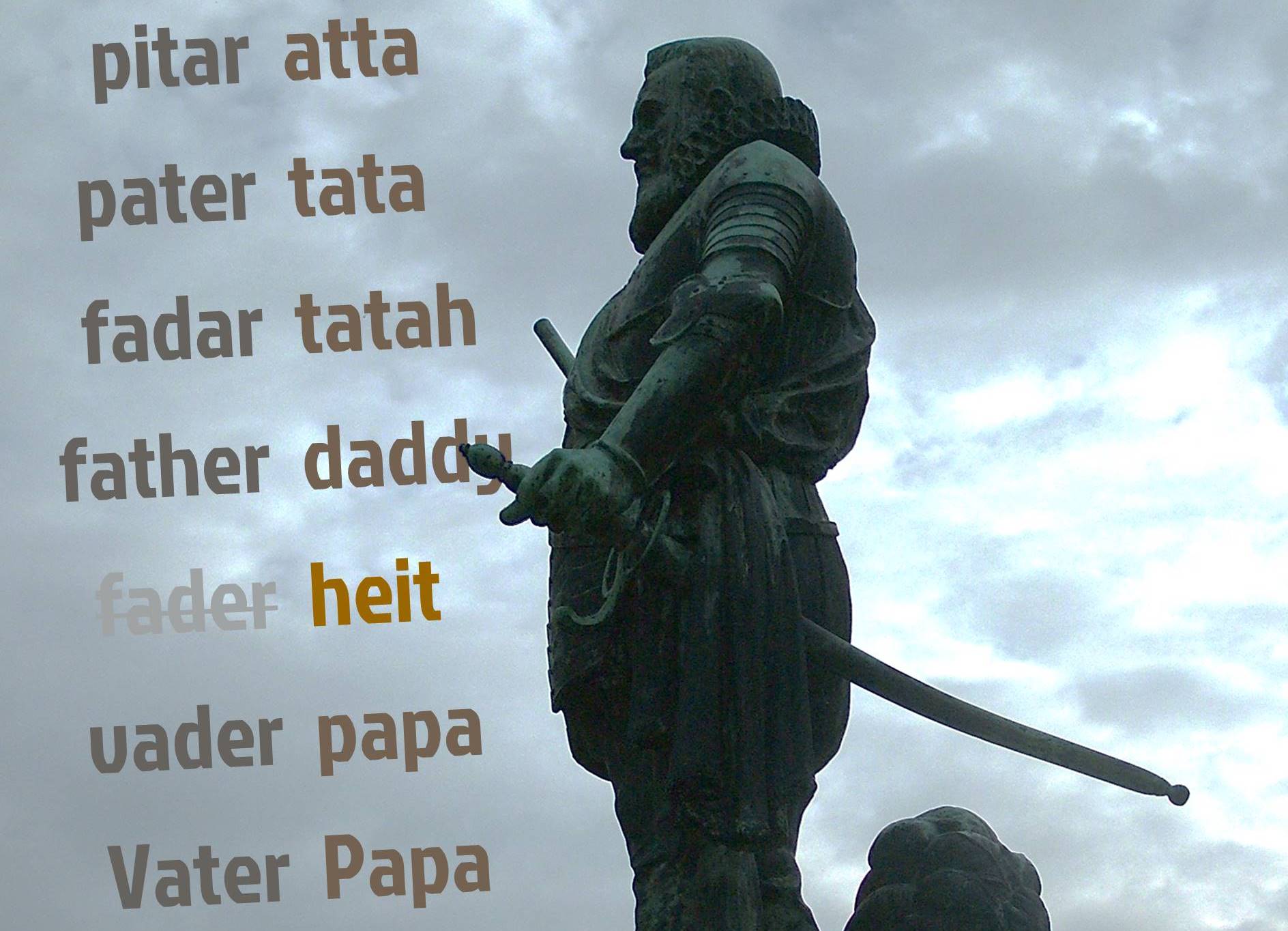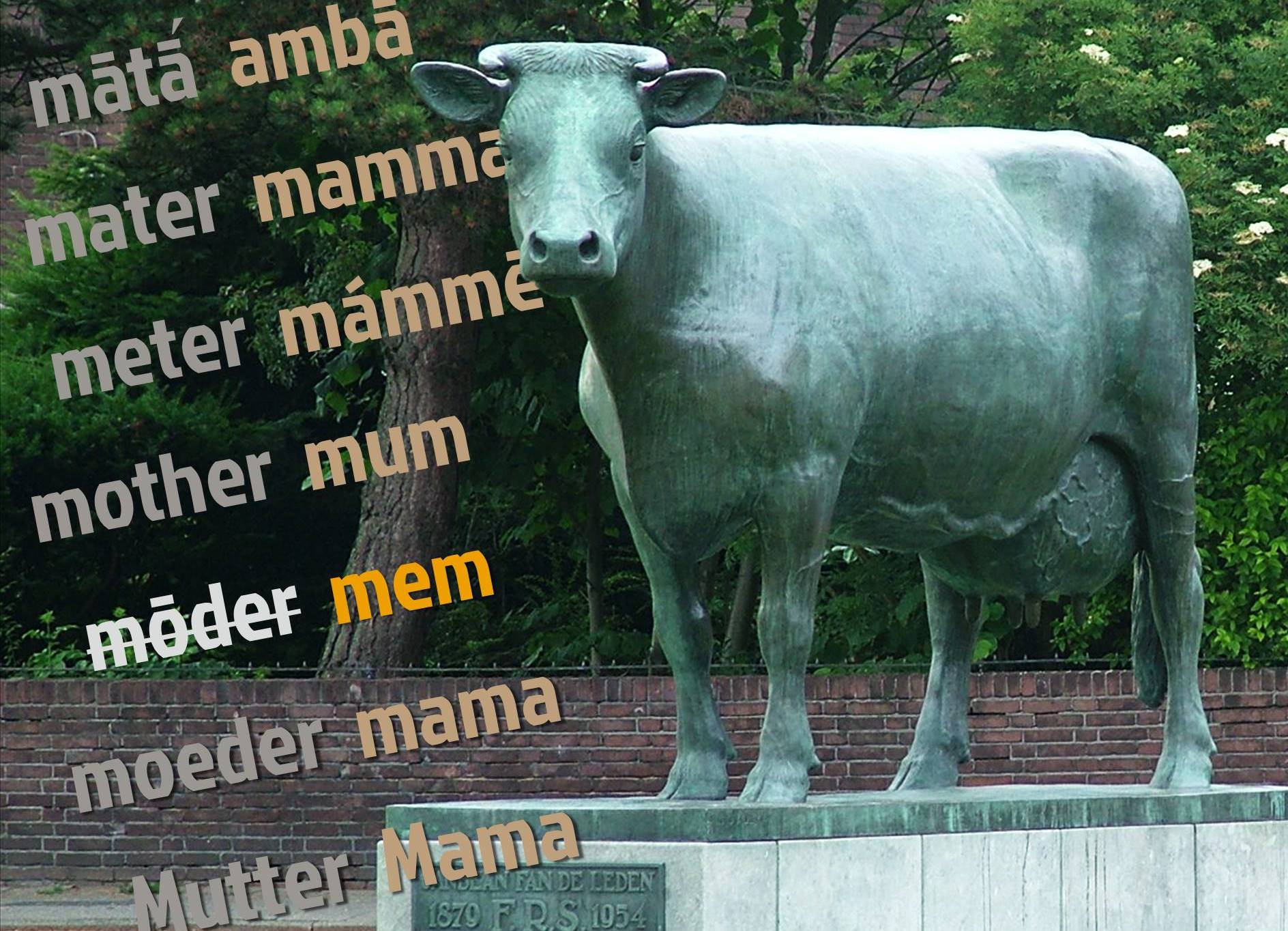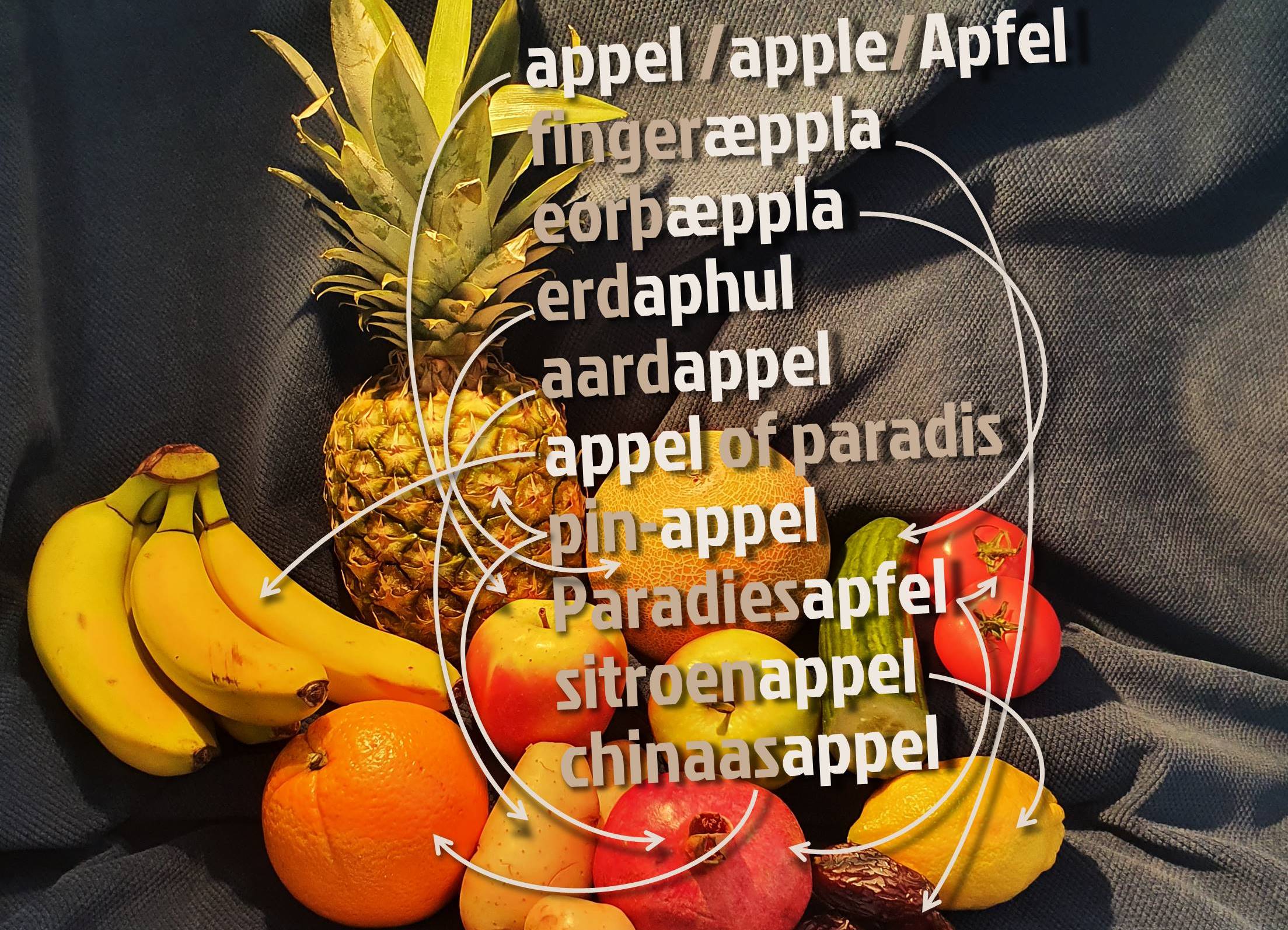WEST GERMANIC
Heit
Linguistics
| 15-06-2021
From German, Dutch and English Vater, vader and father to fadar, pater and pitar in Gothic, Latin and Sanskrit: it is clearly visible that these words resemble each other. A striking exception to this list is Frisian heit. Why? And has it always been that way?

Central vocabulary
The languages we know today have come into being over many centuries. Each of those languages has very recent words, words dating back to centuries before our era, and everything in between. Many of the oldest words in the West Germanic languages have similarities with words in other Indo-European languages. According to the most common theory (the Kurgan hypothesis), the origin of the Indo-European culture and language lies in an area in the east of Ukraine, in the period of ± 4500-3500 BC. In the centuries that followed, the Indo-Germans moved to the area we now call Western Europe, where they mingled with the "dolmen builders" who already lived in that area at that time. Since then, of course, society has changed a lot, but some very mundane things have remained the same, even in what we call them. You can think of family terms such as father, mother, brother and sister, but also certain body parts, weather phenomena, heavenly bodies, plants and trees, and so on. These words are called the central vocabulary or core lexicon, and you can find them in almost all Indo-European languages.
Father
The word father is one of the words in that central vocabulary, meaning that the word for a man who has one or more children can be traced back to the same original word in languages all over the world. Keep in mind that "the same word" does not necessarily mean that it was pronounced exactly the same everywhere. That is why it is often referred to as a "stem", a kind of basic form of a word. Based on all known variants of the word father, linguists have reconstructed that those words go back to the root *ph2tḗr, which – if I understand correctly – should be pronounced roughly as "pateer", possibly pronouncing p with a little air after it. In the Germanic area that sound changed to an f, which you can still see and hear in English father. In Dutch and German the voiceless f ("only air") changed again later into a voiced v ("with vibrating vocal cords"), although I have the impression that most Dutch people nowadays pronounce the word with an f again, even though we write vader, with a v.
From faar to heit
In Old Saxon 'people wrote' fadar, in Old High German fater, in Old Dutch fadar or fader, in Old English fæder and in Old Frisian feder or fader. So until then – roughly before 1550 – Frisian did not deviate from the central vocabulary as far as the word for father is concerned. In fact, the EWN also mentions a New Frisian variant, which means it's from after 1550: faar. Sometime between 1550 and now that word died out in Frisian, in favour of the word heit (pronunciation varying from hɛi̯t to hai̯t and hɔi̯t). The Wurdboek fan de Fryske taal (Dictionary of the Frisian language) dates the word to 1802, but also mentions fader, which is dated to 1820. The two words therefore co-existed for a while. Unfortunately, I don't learn anything about the origin of the word from the lemma "heit"; behind “Etymology:” there's only a comma. What does take me further is the child's speech variant deite, which refers, among other things, to the English dad, daddy. Would it be English again that teaches me the etymology of a Frisian word?
Deite, daddy, papa, paus
The form daddy is a colloquial diminutive of dad, dating from around 1500. The oldest sources of that word, dad, dates from around the same time, but the word is probably much older. The Online Etymology Dictionary speaks of a word from from child's speech, that's nearly universal and probably prehistoric, similar to Welsh tad, Irish daid, Latin tata, and many other forms that children say to their fathers. Something like papa in Dutch and German, whether or not taken from French. That word is in turn related to pāpa, Latin for the Church Father whom we call paus in both Dutch and Frisian, pope in English and Papst in German. However, the word Church Father isn't translated into Frisian as tsjerkeheit, but as tsjerkfaar, in which that old New Frisian variant can still be found. There may be a few other specific father forms to which this applies, but in general faar is no longer used in Frisian.
In contrast to most other languages, in which informal forms such as papa and dad coexist with more formal forms such as vader and father, the more informal and therefore more personal variant heit has become the only common variant in Frisian. I think this informal approach fits in with the Frisian culture, and it may also have to do with the usual Frisian form of address: not Wolle jo efkes helpe? ("Would you like to help?"), but Wol heit efkes helpe? ("Would daddy like to help?"). As a result, heit instinctively almost becomes a name, rather than a concept, to which a more informal form of the word fits well. But the latter is all my own interpretation.

HEIT AND MEM
What I write in this piece about the word heit, also applies to a large extent to its female counterpart mem. That's why I made two versions of this article. Because both words have different origins and history, there are of course also quite some differences to be discovered when you read both variants. You can find the version about mem here.
The languages we know today have come into being over many centuries. Each of those languages has very recent words, words dating back to centuries before our era, and everything in between. Many of the oldest words in the West Germanic languages have similarities with words in other Indo-European languages. According to the most common theory (the Kurgan hypothesis), the origin of the Indo-European culture and language lies in an area in the east of Ukraine, in the period of ± 4500-3500 BC. In the centuries that followed, the Indo-Germans moved to the area we now call Western Europe, where they mingled with the "dolmen builders" who already lived in that area at that time. Since then, of course, society has changed a lot, but some very mundane things have remained the same, even in what we call them. You can think of family terms such as father, mother, brother and sister, but also certain body parts, weather phenomena, heavenly bodies, plants and trees, and so on. These words are called the central vocabulary or core lexicon, and you can find them in almost all Indo-European languages.
Father
The word father is one of the words in that central vocabulary, meaning that the word for a man who has one or more children can be traced back to the same original word in languages all over the world. Keep in mind that "the same word" does not necessarily mean that it was pronounced exactly the same everywhere. That is why it is often referred to as a "stem", a kind of basic form of a word. Based on all known variants of the word father, linguists have reconstructed that those words go back to the root *ph2tḗr, which – if I understand correctly – should be pronounced roughly as "pateer", possibly pronouncing p with a little air after it. In the Germanic area that sound changed to an f, which you can still see and hear in English father. In Dutch and German the voiceless f ("only air") changed again later into a voiced v ("with vibrating vocal cords"), although I have the impression that most Dutch people nowadays pronounce the word with an f again, even though we write vader, with a v.
From faar to heit
In Old Saxon 'people wrote' fadar, in Old High German fater, in Old Dutch fadar or fader, in Old English fæder and in Old Frisian feder or fader. So until then – roughly before 1550 – Frisian did not deviate from the central vocabulary as far as the word for father is concerned. In fact, the EWN also mentions a New Frisian variant, which means it's from after 1550: faar. Sometime between 1550 and now that word died out in Frisian, in favour of the word heit (pronunciation varying from hɛi̯t to hai̯t and hɔi̯t). The Wurdboek fan de Fryske taal (Dictionary of the Frisian language) dates the word to 1802, but also mentions fader, which is dated to 1820. The two words therefore co-existed for a while. Unfortunately, I don't learn anything about the origin of the word from the lemma "heit"; behind “Etymology:” there's only a comma. What does take me further is the child's speech variant deite, which refers, among other things, to the English dad, daddy. Would it be English again that teaches me the etymology of a Frisian word?
Deite, daddy, papa, paus
The form daddy is a colloquial diminutive of dad, dating from around 1500. The oldest sources of that word, dad, dates from around the same time, but the word is probably much older. The Online Etymology Dictionary speaks of a word from from child's speech, that's nearly universal and probably prehistoric, similar to Welsh tad, Irish daid, Latin tata, and many other forms that children say to their fathers. Something like papa in Dutch and German, whether or not taken from French. That word is in turn related to pāpa, Latin for the Church Father whom we call paus in both Dutch and Frisian, pope in English and Papst in German. However, the word Church Father isn't translated into Frisian as tsjerkeheit, but as tsjerkfaar, in which that old New Frisian variant can still be found. There may be a few other specific father forms to which this applies, but in general faar is no longer used in Frisian.
In contrast to most other languages, in which informal forms such as papa and dad coexist with more formal forms such as vader and father, the more informal and therefore more personal variant heit has become the only common variant in Frisian. I think this informal approach fits in with the Frisian culture, and it may also have to do with the usual Frisian form of address: not Wolle jo efkes helpe? ("Would you like to help?"), but Wol heit efkes helpe? ("Would daddy like to help?"). As a result, heit instinctively almost becomes a name, rather than a concept, to which a more informal form of the word fits well. But the latter is all my own interpretation.

WEST GERMANIC
Mem

WEST GERMANIC
All apples
WEST GERMANIC
In the West Germanic section, I regularly discuss a word that strikes me. I look at the meanings and forms of the word, and especially at where the word originates from. With that I compare the four West Germanic languages Dutch, English, Frisian and German, with the occasional inevitable trip across the fictional West Germanic border.
